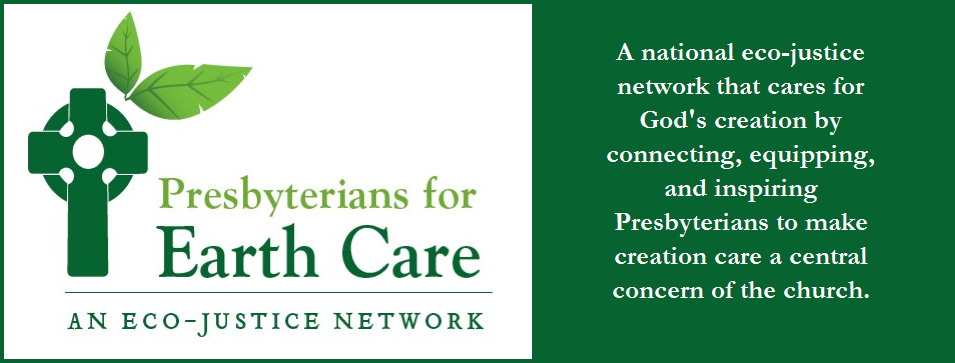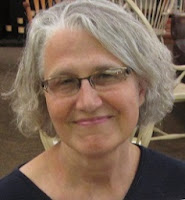A Biblical, Bold and Beautiful New Imperative
from a Sister
Denomination
On July 3, the United Church of Christ (UCC) passed A Resolution
of Witness,“The Earth is the Lord's--Not Ours to Wreck: Imperatives for a New
Moral Era,” calling on clergy to preach and congregations and persons of faith
to set a moral example to protect God’s creation. Presbyterians for Earth Care
affirms the concept of this UCC statement and emphasizes it as a model.
 |
| Photo taken by Dan Hazard, at the United Church of Christ General Synod 31 in Baltimore. |
The statement of the UCC notes that "God's great gift of
creation...is in crisis... The scale of Creation's demise is dramatically
expanding beyond our comprehension. Never has the earth and the climate changed
so quickly. While the leaders of every country in the world recognize this
reality, our current Administration ignores science, defunds the Environmental
Protection Agency, and withdraws from the Paris Climate Accord." The UCC
is sending out a call for "a new moral era."
They note that leaders of over 190 countries have signed the
Paris Climate Accord and that "mayors of 30 American cities, the governors
of numerous states and leaders of hundreds of American companies have publicly
committed the institutions they lead to reducing greenhouse gas emissions in
compliance with the Paris Climate Accord..."
They then resolve to initiate their "new moral era"
and
1. "Let our clergy accept the mantle of
moral leadership...
2. Let all of us incarnate the changes we long
for...[and]
3. Let us proclaim truth in the public
square"
Truly bold is their statement that we must hold to the truth,
recognizing that truth can and is being compromised. They call for commitment
"to resist all expansion of fossil fuel infrastructure and demand new
sources of renewable energy that are accessible to all communities."
Let us truly have ears to hear and courage to join with our
sisters and brothers in this Resolution of Witness. Let us pray, join hands and
stand resolute in the truth we know that creation is a sacred gift, this earth
is our home, and God is leading us to care for and stand in Faithful Resistance
in this new Moral Era.
Diane Waddell
PEC Moderator
(The PEC Advocacy Committee and Steering Committee feel this is
a very important document and are currently discerning ways to create a similar
statement. We all need each other's prayers.)

 As Co-Chair of the Cascades Presbytery Eco-Justice Team, what have been some of the most meaningful experiences and projects?
As Co-Chair of the Cascades Presbytery Eco-Justice Team, what have been some of the most meaningful experiences and projects? Jenny Holmes lives in Portland, Oregon with her husband John and dog Verda. She is coordinating the 2017 PEC Conference Coordinator and is a past PEC moderator. She also works for Southern Utah Wilderness Alliances as the WA-OR Field Organizer and is former Environmental Ministries Director for Ecumenical Ministries of Oregon.
Jenny Holmes lives in Portland, Oregon with her husband John and dog Verda. She is coordinating the 2017 PEC Conference Coordinator and is a past PEC moderator. She also works for Southern Utah Wilderness Alliances as the WA-OR Field Organizer and is former Environmental Ministries Director for Ecumenical Ministries of Oregon. Karen Keady is a member of Westminster Presbyterian Church in Eugene, Oregon. She is ordained as a deacon and a ruling elder, serves as an occasional fill-in worship leader in local congregations, works with Christian education programs and liturgical season contemplative activities and with Westminster’s Creation Care group. She is currently researching and writing about arts ministry.
Karen Keady is a member of Westminster Presbyterian Church in Eugene, Oregon. She is ordained as a deacon and a ruling elder, serves as an occasional fill-in worship leader in local congregations, works with Christian education programs and liturgical season contemplative activities and with Westminster’s Creation Care group. She is currently researching and writing about arts ministry.

 Holly Hallman lives in the Pacific Northwest among the foxgloves and next to the waters of Puget Sound. She, and husband Fred, grow great radishes that they hope to eat with fresh crab—soon.
Holly Hallman lives in the Pacific Northwest among the foxgloves and next to the waters of Puget Sound. She, and husband Fred, grow great radishes that they hope to eat with fresh crab—soon.

